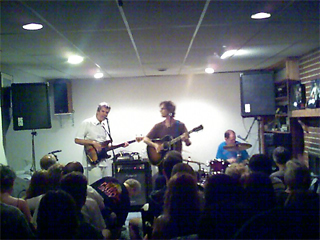Computational chemistry is a branch of chemistry that uses computer simulation to assist in solving chemical problems. It uses methods of theoretical chemistry, incorporated into efficient computer programs, to calculate the structures and properties of molecules and solids. It is necessary because, apart from relatively recent results concerning the hydrogen molecular ion, the quantum many-body problem cannot be solved analytically, much less in closed form. While computational results normally complement the information obtained by chemical experiments, it can in some cases predict hitherto unobserved chemical phenomena. It is widely used in the design of new drugs and materials.
Physical chemistry is the study of macroscopic, atomic, subatomic, and particulate phenomena in chemical systems in terms of the principles, practices, and concepts of physics such as motion, energy, force, time, thermodynamics, quantum chemistry, statistical mechanics, analytical dynamics and chemical equilibrium.
A metalloid is a type of chemical element which has properties in between, or that are a mixture of, those of metals and nonmetals. There is neither a standard definition of a metalloid nor complete agreement on the elements appropriately classified as such. Despite the lack of specificity, the term remains in use in the literature of chemistry.

In chemistry, a group is a column of elements in the periodic table of the chemical elements. There are 18 numbered groups in the periodic table, and the f-block columns are not numbered. The elements in a group have similar physical or chemical characteristics of the outermost electron shells of their atoms, as most chemical properties are dominated by the orbital location of the outermost electron. There are three systems of group numbering. The modern numbering group 1 to group 18 is recommended by the International Union of Pure and Applied Chemistry (IUPAC). It replaces two older naming schemes that were mutually confusing. Also, groups may be identified by their topmost element or have a specific name. For example, group 16 is variously described as the oxygen group and as the chalcogens.

In chemistry, the noble metals are metals that are resistant to corrosion and oxidation in moist air. The short list of chemically noble metals comprises ruthenium (Ru), rhodium (Rh), palladium (Pd), silver (Ag), osmium (Os), iridium (Ir), platinum (Pt), and gold (Au).

Oasis were an English rock band formed in Manchester in 1991. Developed from an earlier group, the Rain, the band originally consisted of Liam Gallagher, Paul "Bonehead" Arthurs (guitar), Paul "Guigsy" McGuigan and Tony McCarroll (drums). Upon returning to Manchester, Liam's older brother, Noel Gallagher joined as a fifth member, which formed the band's core and settled line-up. During the course of their existence, they had various line-up changes.

Heathen Chemistry is the fifth studio album by English rock band Oasis, released on 1 July 2002 by Big Brother Records.
In chemistry and atomic physics, the electron affinity (Eea) of an atom or molecule is defined as the amount of energy released or spent when an electron is added to a neutral atom or molecule in the gaseous state to form a negative ion.

Semisonic is an American alternative rock band formed in Minneapolis, Minnesota in 1995. The band has three members: Dan Wilson, John Munson, and Jacob Slichter. They are best known for their 1998 single "Closing Time".
Free energy may refer to:
Amsterdam Density Functional (ADF) is a program for first-principles electronic structure calculations that makes use of density functional theory (DFT). ADF was first developed in the early seventies by the group of E. J. Baerends from the Vrije Universiteit in Amsterdam, and by the group of T. Ziegler from the University of Calgary. Nowadays many other academic groups are contributing to the software. Software for Chemistry & Materials (SCM), formerly known as Scientific Computing & Modelling is a spin-off company from the Baerends group. SCM has been coordinating the development and distribution of ADF since 1995. Together with the rise in popularity of DFT over the last decade, ADF has become a popular computational chemistry software package used in the industrial and academic research. ADF excels in spectroscopy, transition metals, and heavy elements problems. A periodic structure counterpart of ADF named BAND is available to study bulk crystals, polymers, and surfaces. The ADF Modeling Suite has expanded beyond DFT since 2010, with a GUI to Stewart's semi-empirical MOPAC code, and the Quantum_ESPRESSO plane wave code, a density-functional based tight binding (DFTB) module, a reactive force field module ReaxFF, and an implementation of Klamt's COSMO-RS method.
Force field may refer to:
Yeasayer is an American experimental rock band from Brooklyn, New York, formed in 2006. The band consists of Chris Keating, Ira Wolf Tuton and Anand Wilder.
In chemical nomenclature, a preferred IUPAC name (PIN) is a unique name, assigned to a chemical substance and preferred among the possible names generated by IUPAC nomenclature. The "preferred IUPAC nomenclature" provides a set of rules for choosing between multiple possibilities in situations where it is important to decide on a unique name. It is intended for use in legal and regulatory situations.
The Heathen Chemistry World Tour was a concert tour by English band Oasis, which took place between 2002 and 2003. The tour was in promotion of their record Heathen Chemistry
The International Union of Pure and Applied Chemistry (IUPAC) has published four sets of rules to standardize chemical nomenclature.





